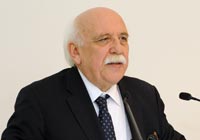News
Istanbul Chamber of Industry Hosts Prof. Dr. Nabi Avcı, Minister of National Education, in February Assembly Meeting
- 24.02.2016
- News

The ordinary Assembly meeting of the Istanbul Chamber of Industry (ICI) convened with the main theme of "The Importance of a Quality Education System and Vocational Education for the Future of the Industry and the Economy in an Era of Global Competition and Information". The meeting was attended by Prof. Dr. Nabi Avcı, the Minister of National Education, and Prof. Dr. Ömer Dinçer, former Minister of National Education and Minister of Labor and Social Security.
Delivering the opening speech, Erdal Bahçıvan, ICI Chairman, stressed the lack of qualified workforce affecting the industry. "Vocational education can bridge the gap between education and employment. The struggle for building this bridge should focus explicitly on vocational education. Technological advances pose the risk of encouraging languor. Developing countries must remain vigilant against the pitfalls of lethargy," Bahçıvan said.

Prof. Dr. Nabi Avcı, the Minister of
National Education
Nabi Avcı highlighted the silent revolution Türkiye's vocational and technical education is going through. "We attach great importance to vocational and technical education. The overall budget of the Ministry of National Education was 7.5 billion TL back in 2002; today, 8.7 billion TL is allocated for vocational education alone. Vocational and technical education is our top priority in teacher appointment. Türkiye is undergoing a silent revolution in this regard," said Avcı, also noting the Ministry's plans for supporting vocational schools outside organized industrial zones (OIZs) and eliminating negative connotations associated with vocational education. Minister Avcı also thanked the Istanbul Chamber of Industry Foundation for the alumni follow-up system. "It has been inspiring for the Ministry to see you maintain such a close-follow up with alumni," said Avcı.
The February meeting of the ICI Assembly commenced with the opening address of Zeynep Bodur Okyay, President of the Assembly. Okyay stressed the importance of school-industry cooperation, noting the global challenges and the ongoing "Industry 4.0".

Zeynep Bodur Okyay,
President of the ICI Assembly
"Türkiye has made significant progress since 2002, and we welcome this progress. However, there are certain problems relating to preschool education as well as access and participation in education for girls, seasonal agricultural workers and immigrants. Türkiye has a young population. In this regard, we believe that the vocational adaptability of youth must be developed even further. According to a study by the Ministry of Science, Industry and Technology, the level of satisfaction in vocational education is inadequate. For example, satisfaction in the current level of industry, school and university partnerships is very low. Newly recruited young people require six months of training to learn the ropes. We must provide necessary training for them to close this gap. We believe that we can work together to determine an effective method to increase the quality of education. At ICI, as industrialists, we are ready to play our part."
In his speech, Erdal Bahçıvan, ICI Chairman, noted that as production regained its importance worldwide, transitioning into a high-added value production and import structure was a top priority for both the government and industrialists.

Erdal Bahçıvan, ICI Chairman
Noting that high-value-added production was only possible with a highly trained, qualified workforce, Bahçıvan said: "Access to qualified workforce is still a challenge for industrialists. Being unable to find qualified personnel despite the ongoing issue of unemployment is quite thought provoking in itself. Sad but true: our country still lacks a strong bridge to fill the gap between education and employment. We believe that the struggle for building this bridge should focus explicitly on vocational education. One of the most significant aspects of this focus is the need to address the lack of connection between the school and the workplace."
Developing countries should avoid languor
Highlighting the birth of an information-based new economy in the Information Age, Bahçıvan noted the risk of languor brought about by technological advances, warning developing countries to remain vigilant against the pitfalls of lethargy. "In the Information Age, we, as industrialists, strive to understand the interrelationship between production, economy and information. The fact is clear: our existence in tomorrow's world depends on our ability to act in accordance with the zeitgeist of today," said Bahçıvan.
Countries with low-quality education will suffer significant losses
Naming information and a highly educated workforce as the key drivers of economic development, Bahçıvan defined the workforce of a production-oriented, developed country as one "able to achieve optimization, adaptable to economic and technological changes, capable of long-term thinking, in a constant state of renewal, capable of cooperation, capacity for global-level thinking, informed and productive". Bahçıvan also claimed that countries with low-quality education and lacking in knowledge, R&D capacity and innovation would suffer significant losses and problems in the future. "We must struggle harder than ever to create a Türkiye that has gained competitive strength in the global arena. This effort is vital for the future of our country, given its current position as the 51st among 140 countries on the latest Global Competitiveness Index," Bahçıvan said.
Stressing Türkiye's need for young people that will make a reputation for themselves with what they produce, rather than what they consume, Bahçıvan reminded the ICI's special emphasis on education as well as on youth, the foundation of the future. "We realized the 'Life is in the Classroom' project in pilot schools. The project, a first in our country, aims to increase achievement rates and address student-related problems. The Istanbul Chamber of Industry Foundation continues to offer scholarship opportunities for high achieving students at every level. This year the number of scholarship students increased to five hundred. In 2015, we provided scholarships to doctorate level students for the first time."
Taking the stage after Bahçıvan, Prof. Dr. Nabi Avcı, the Minister of National Education, started his speech by expressing his gratitude to the late members of the Istanbul Chamber of Industry Foundation and the ICI for their contribution to the country's education.
"Our recent School-Industry Cooperation Istanbul Model signed between the ICI and the Ministry of National Education is an exemplary work that will contribute to our efforts for providing the youth in Türkiye with education opportunities in line with the requirements of the 21st Century. Türkiye is facing many challenges, and in an environment marked by global competition, education also means developing solutions for these challenges," Avcı said.
Minister Avcı mentioned the new FATİH project, remarking on its transformation into a significant complementary portal. Pointing out the need to harmonize a system like education that is constant by its very nature with new technologies, Avcı noted how students had other sources to provide them with the information they obtained in school. Avcı also commented that new technologies, tablets and smart blackboards allowed students to learn faster than before, eliminating the teacher's traditional role as the sole authority in the classroom.
Minister Avcı also mentioned the ongoing restructuring of vocational and technical education, stressing the importance of the School-Industry Cooperation Istanbul Model signed with the ICI. Avcı named the three prominent components of the model as technology, data sharing and employment. Avcı told that their efforts were based on the understanding of "a person grows only in another's shadow", noting the importance they assigned to the sharing of experience through organizations such as the ICIF Scholarship Student Discussions.
Avcı noted that the overall budget of the Ministry of National Education was 7.5 billion TL back in 2002 while today 8.7 billion TL was allocated for vocational and technical education alone. Avcı also mentioned the recent silent revolution Türkiye was undergoing with regard to vocational and technical education, also noting the Ministry's plans for establishing private vocational and technical schools outside organized industrial zones with the aim to provide individual support for students. Avcı mentioned that students in 57 vocational and technical high schools, 23 of them private, received education grants ranging from 3,500 to 6,500 TL, and stressed the need for eliminating negative connotations associated with vocational education. Minister Avcı also thanked the Istanbul Chamber of Industry Foundation for the alumni follow-up system, saying, "It has been inspiring for the Ministry to see you maintain such a close-follow up with alumni".